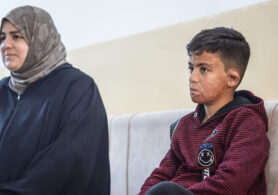Today, the Dutch House of Representatives will vote on a resolution to allow for the armament of their drones. It is predicted that a majority will vote in favor.
In 2013, the Dutch parliament gave the Ministry of Defence permission to purchase four MQ-9 Reapers. At the time, to circumvent critics in the House of Representatives, the MoD claimed that these Reapers would only be used for reconnaissance and surveillance-related tasks, but would not be armed. The aircraft are assigned to the Royal Airforce’s 306 Squadron at Leeuwarden Air Base. The first ones were received from the manufacturer in the summer of 2021 and for the last couple of years, pilots have been trained in the US. No sooner than the first fully functioning reconnaissance flight took place yesterday, is the House of Representatives now seemingly clearing the way for them to be armed.
The resolution was drafted by Peter Valstar (VVD), who stated that it would be a waste of high-tech equipment to only use the MQ-9 Reapers for reconnaissance and surveillance. Referring to the role UAVs currently play in the invasion of Ukraine, he argued that armed drones can make a real difference in war. But his evidence is anecdotal and ignores all the research that has been done on the detrimental impact of drone wars.
Already in 2020, IRW project leader Lauren Gould and IRW researcher Isa Zoetbrood warned in NRC that armed drones may lead us down a slippery slope towards more war and more civilian harm, not less. Drones undergird the narrative of ‘precision’, which makes contemporary warfare politically viable and socially acceptable. But the perceived accuracy of contemporary aerial warfare is, just as in the Hawija-case, subverted by the empirical reality. Despite an abundance of intelligence, the US track record in deploying armed drones in Afghanistan, Pakistan, Yemen, and Somalia shows that civilian harm is still staggeringly common. Investigations by Human Rights organization Reprieve revealed that between 2002 and 2014, the US killed 1147 people while targeting just 41 terrorists. In one case, a horrifying 128 civilians were killed in six strikes aimed at just one target.
Fellow drones specialists Jessica Dorsey from Utrecht University and Wim Zwijnenburg from PAX for Peace backed us up this week in the NRC and Volkskrant with similar claims.
If our joint report ‘After the Strike’ on the reverberating effects of the 2015 ‘precision’ airstrike by two Dutch F-16s shows us anything, it is that the possibility of a precise remote war is an illusion and that the Dutch Ministry of Defence should first increase their ability to research and be held accountable for potential civilian harm consequences before lowering the threshold to engage in kinetic military action. Because that – as argued by Gould and Zoetbrood – is exactly what allowing the Dutch military to arm its Reapers does.
The House of Representatives should take their role to regulate the wars that are fought in our names seriously and first research and debate at length what it will mean for future wars and our democratic control over them if the Netherlands deploys armed MQ-9 Reaper drones.



